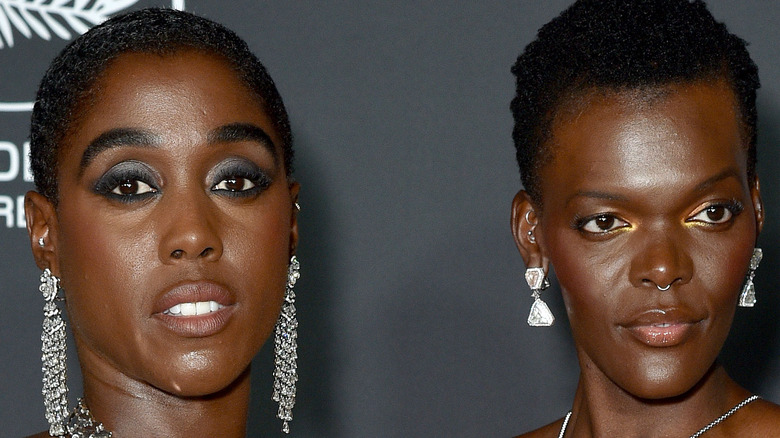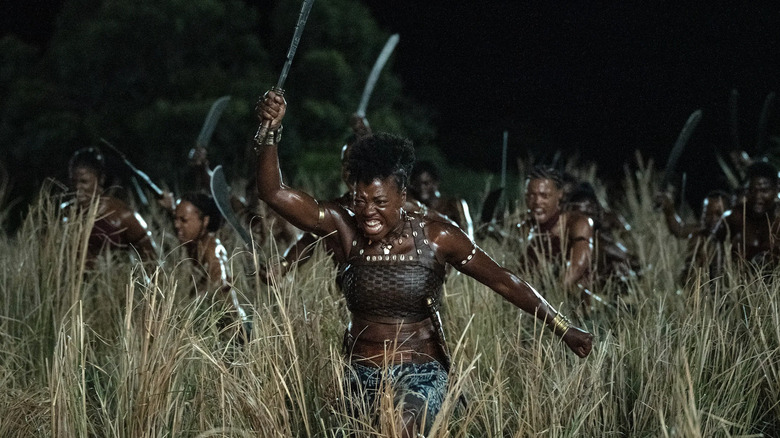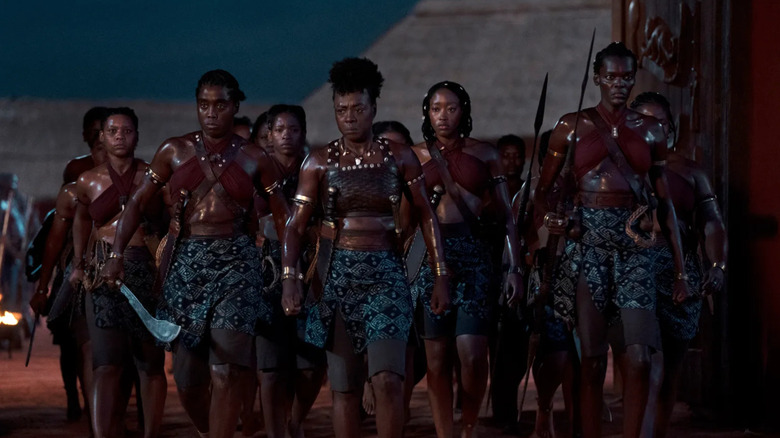Lashana Lynch, Sheila Atim, And John Boyega On The Woman King's Royalty And Warriors - Exclusive Interview
"The Woman King," Gina Prince-Bythewood's new film about how the Agojie woman warriors fought for the African kingdom of Dahomey in the 1820s, might be focused on Viola Davis's General Nanisca, but it's very much an ensemble film, weaving in and out of many different characters' personal stories. Lashana Lynch (recognizable from "No Time to Die" and "Captain Marvel") plays Izogie, a lieutenant who trains the new recruits with a firm but caring hand. Sheila Atim ("The Underground Railroad," "Doctor Strange in the Multiverse of Madness") plays fellow lieutenant and spiritual leader Amenza. John Boyega ("Attack the Block," the "Star Wars" sequel trilogy) plays King Ghezo, a real historical figure who is portrayed here as conflicted between continuing to profit from the slave trade and doing the moral thing of ending it.
Looper got the chance to speak to Lynch, Atim, and Boyega ahead of the premiere of "The Woman King" at the 2022 Toronto International Film Festival. Our time together was limited, but these talented actors shared what drew them to the movie and how they studied and trained for their demanding parts.
First reactions to The Woman King
What did you all think when you first heard about this movie?
Lashana Lynch: Ooh. So many things.
Sheila Atim: I first thought, "I really want to see this," because I first heard about the announcement of the film before I was even called in to ... I was cast quite late, so I was like, "Oh, I can't wait till this comes out," and here we are.
Lynch: [When] I had a conversation with Gina, I remember thinking, "It could be me [or] could not be me. That's fine. I'm just thanking you. I'm thanking you for doing it, thanking you for writing it, for getting it made, having it made now." I know that we've had many years of wanting movies like this to be made, but nothing before its time. There's clearly a reason why it's dropping now. I was just grateful that it was a part of my life story to be able to witness this and to be able to exist in an industry as an adult [and] remember that it happened and have people have a conversation about it — not just a conversation, but [for] there to be change off the back of it. I was really happy to be a part of it but was just so happy for young people to see it and for different generations to see themselves within this movie. Yes.
John Boyega: Yeah. I second that.
John, you're one of the few actors in this movie playing a real historical figure. How did you approach portraying King Ghezo?
Boyega: The first thing was collaboration, between research and then some conversations with myself and Gina [about] what she wanted specifically in this project. The rest is playing as an actor: imagination, character work, figuring out the arc between the first and the second act, and then letting the ladies do their thing. Then, having a good spirit [among] an ensemble cast. This is a cast full of so many different characters, so we all had to discuss each dynamic. It was consistently doing that until I came on set and met everybody else.
Physical training was intense but rewarding
Speaking of the ladies, you both kick some serious a** in this movie. What was training like?
Lynch: Sheila?
Boyega: [punches and kicks in the air] Isn't this is what you lot are doing? [Lynch and Atim laugh] How's that look when the king do it?
Lynch: Perfection. Different kind of training with the king.
Atim: It was intense, but it was necessary.
Lynch: Rewarding.
Atim: Yeah, rewarding and necessary. It got to a point where all of us saw it as nothing less than necessary, because it gave us so much — not just the physicality that we needed to be convincing warriors on screen but also the discipline, the mental conditioning, the camaraderie, and the sisterhood as well. So many elements about the training really fed into the wider remit of what we had to do as actors to be able to execute this story. But it was hard. There were days when we would run and hide from our personal trainer, Gabriela Mclain — physically hide. As a grown woman in my 30s, I hid behind a tree so that the personal trainer wouldn't find me because I didn't want to [train] that day. She's lovely, by the way. As a person, she's wonderful and was such a rock for us. But it was a great challenge that I'm glad to say we went through.
Lynch: It's so rare to be able to step into your character's actual shoes, to know that these women would've trained every single day, morning, noon, and night, no matter the weather, no matter what's going on in their lives, no matter how they feel their trauma that day, no matter who said what. They're amongst their family and they are training with their family. So we became a family, having to push our bodies in ways that we couldn't imagine and to push ourselves in ways that we needed on days when it was really tough. [It was] 3:00 a.m. wielding a machete and a spear, and questioning, "How are we able to do this? How are we physically doing this? I don't even understand how this is possible for us." But for the women that we're representing, it was their [routine] every day. I was grateful that we were able to emulate a little bit of what they were, in our lives, to be able to portray them authentically.
"The Woman King" opens in theaters on September 16.
This interview has been edited for clarity.


